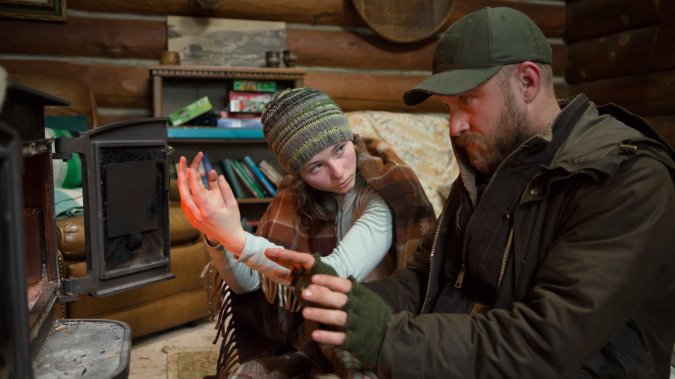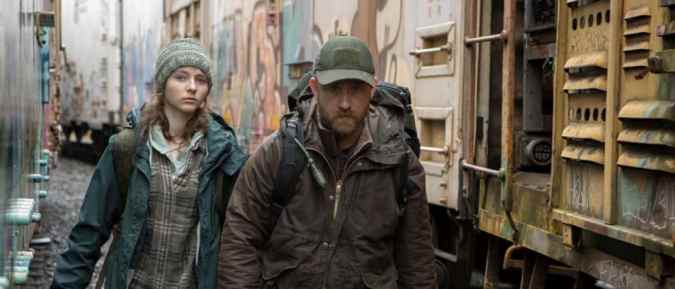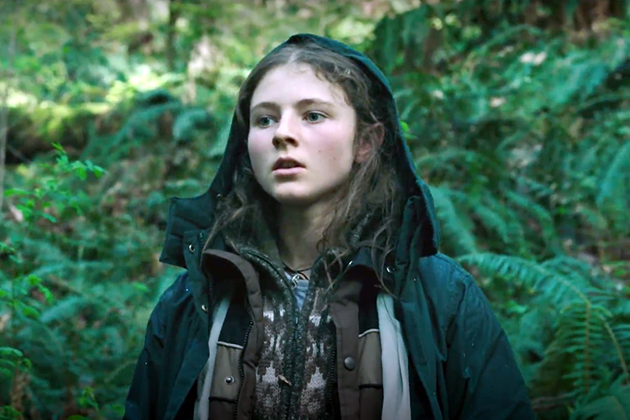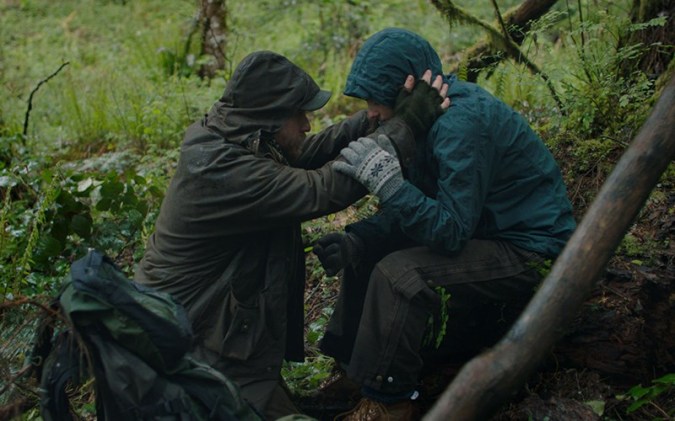Leave No Trace was written and directed by indie filmmaker Debra Granik, best known for 2010’s Winter’s Bone, and is based on a book by Peter Rock. It stars Ben Foster and Thomasin McKenzie as a father-daughter duo who live in the wilderness and are forced to reintegrate into society. Granik has launched the careers of several young actresses with her films before (Vera Farmiga and Jennifer Lawrence in their breakthrough roles). Can lightning strike a third time with young McKenzie? *Mild Spoilers Ahead!*

So here’s the thing with Leave No Trace: it’s basically Captain Fantastic. It shares so many similarities with the 2016 film starring Viggo Mortensen that it’s impossible not to compare them. I hate comparing movies to one another when judging their merit, but it has to be done because the story is almost beat-for-beat identical. In both stories, a father with strong personal convictions takes his child/children into the wildnerness to be self-sufficient and separate from society, then for one reason or another must help said children re-acclimate to society, reckoning with the child’s self-doubts and his own shortcomings as a providing parent. Don’t get me wrong, both of these are excellent films, but I can’t help but think about what each film did better than the other at certain points, so I’ll try to get it all out of the way first.
One of my issues with Captain Fantastic was that it was all rather on-the-nose with its social commentary. Characters spelled out in plain terms what the themes of the film were and what lessons needed to be learned. Leave No Trace is a more cerebral experience; we gauge character motivations and feelings through nonverbal cues and behaviors. For instance, we learn of Ben Foster’s character’s past only tangentially; we hear mention that he was in the service, and we see his physical reaction to things like the sound of chopper blades or the bustle of large crowds. Granik is much better about conveying natural emotion, and the film’s style reflects that with a very grounded, unfiltered look at the world. No flashy color schemes, no gaudy soundtrack: just raw wilderness. I also didn’t love Captain Fantastic‘s ending: it took a strange turn in Act III that I felt didn’t really work, and it felt a bit too neatly wrapped up. Leave No Trace felt like a more natural progression of story and character that wrapped up succinctly and appropriately.

What about the film’s merits as a stand-alone? As mentioned earlier, the natural filmmaking approach gives a stark, raw look at living in the wild. I love the way Granik plays with color palates throughout the film: early on we get lush greens, which give way to cold grays when they reenter the city, then dull white and brown as they trudge into the north and things get grim, and finally warm yellows when they find a community that they feel belonging in. There are also tiny details peppered throughout that add a layer of believability, details that only a naturalist would know: like a tarp with a water collection design feature, or what shape an unbroken orange peel takes. Minutia like that went a long way towards maintaining immersion. Even the minor characters felt natural, like we weren’t watching Hollywood actors but people actually living that lifestyle. Interactions with the locals felt genuine and unscripted, which sometimes doesn’t work in a movie but here it’s quite apt given the subject matter.
The story is very well-paced. Both primary characters got roughly equal screen time, and their character development never felt unbalanced or undeserved. We get the sense that young Tom might not want the nomadic life that her father Will does, and finds that she wants human interaction in her life. Meanwhile we see the strain that Will endures from the outside world and understand his desire to be alone, but also the love he has for his daughter and his dilemma of how much to let her make her own decisions. While the story isn’t necessarily outlandish and unexpected, it does move things along briskly and avoid falling into the traps of sentimentality. I was pleasantly surprised with the nuance of the themes and Granik’s lack of fear in moving things along too quickly. She keeps moving, not lingering too long on anything, embracing the nomadic lifestyle like our characters do.

I really appreciated Granik’s approach to exposition, something I always harp on in screenplays. Much like Lynne Ramsey’s You Were Never Really Here, Granik attacks exposition from a more oblique angle, trusting the audience to pick things up for themselves through implication. As mentioned earlier, Will’s characterization comes about subtly, like the helicopter flashbacks or the questionnaire sequence where he struggles to answer simple questions about his life. Similarly, Tom’s motivations and feelings about her lifestyle are conveyed through facial expressions; we see the childlike wonder in her eyes at listening to live music or attending a church service, or the hidden pain in her eyes as Will tells her to pack her things and move on. Minor symbolisms help to further our understanding of characters, like Will’s hesitance to help package identical Christmas trees (fear of living a cookie-cutter lifestyle) or Tom’s affinity for rabbits (a desire for comfort and belonging). I love, love, love when filmmakers show respect for the audience and let us figure things out on our own…we’re pretty smart, I think!
Man, the acting was out of this world. Ben Foster is really good at playing tormented souls, and I’d love to see him do something happier with his career someday, but hey, if it ain’t broke… His portrayal of a man with severe PTSD is haunting, and yet he is able to find heartbreaking depth in his interactions with his daughter. Speaking of which, man is Thomasin McKenzie impressive in her first leading role. It’s not a big, flashy performance by any means: she shows more muted emotions, often concealing her true thoughts (by the design of the screenplay and Granik’s direction no doubt). But that makes her more intense moments all the more powerful: when she has moments of vulnerability, her emotions don’t spill out at once; she is able to control them, like she’s fighting to reign them back in. That’s super hard to pull off for any actor, much less a 16-year-old. Mad props, and the praise for her performance is well-deserved.
Conclusion

I have virtually no flaws with this film. Technically well-shot, well-written, and superbly acted by Ben Foster and breakout Thomasin McKenzie. It didn’t leave me with anything especially profound, but that’s okay…it was worth my money all the same. It’s unfortunate that it’s so similar to the aforementioned Captain Fantastic that the themes and greater questions raised didn’t resonate with me as much. I do think it’s a better movie, however, so there’s that. I look forward to seeing what all parties involved do with their next project!
VERDICT: A-
-Austin Daniel
All image rights courtesy of Bleecker Street.
6 thoughts on ““Leave No Trace” Film Review”